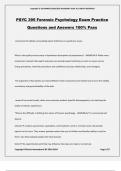Exam (elaborations)
PSYC 395 Forensic Psychology Exam Practice Questions and Answers 100% Pass
PSYC 395 Forensic Psychology Exam Practice
Questions and Answers 100% Pass
summarize the debate surrounding expert testimony on eyewitness issues.
What is the quality and accuracy of eyewitness descriptions of perpetrators? - ANSWER-While many
researchers maintain that expert witnesses can prov...
[Show more]
Preview 4 out of 57 pages
Uploaded on
November 11, 2024
Number of pages
57
Written in
2024/2025
Type
Exam (elaborations)
Contains
Questions & answers
Institution
Prep Tests
Course
Prep Tests
$13.49
100% satisfaction guarantee
Immediately available after payment
Both online and in PDF
No strings attached
Copyright © OLIVIAWEST2024/2025 ACADEMIC YEAR. ALL RIGHTS RESERVED




